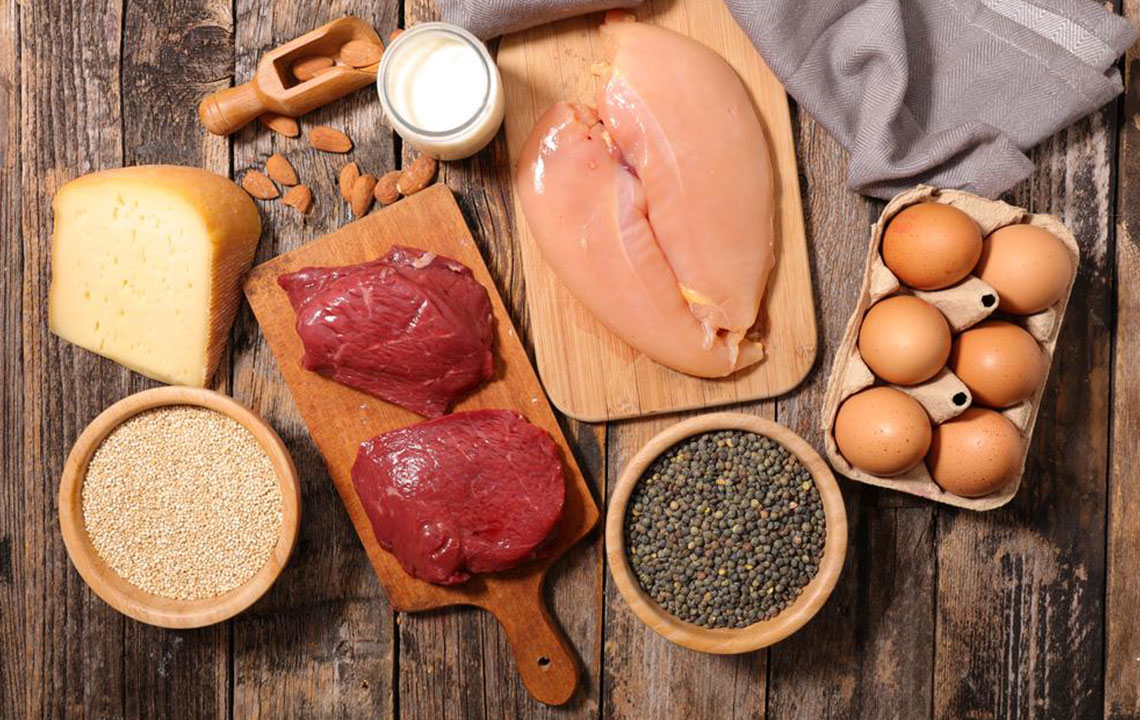Balance Your Diet with This List of High-protein Foods
It is very easy to lose sight of your health in today’s life. With increasing cases of various diseases, it becomes vital to use every opportunity to remain healthy. Diet and exercise are two vital components to lead a healthy lifestyle. A diet is considered the single most crucial aspect of a healthy routine.
Maintaining a balanced diet is extremely difficult and getting the right kind of nutrition while eating the right quantity of food can be a tricky balancing act. A well-balanced diet should have small servings of fiber, complex carbohydrates, minerals, vitamins, and protein. You should not overcompensate one aspect of the diet for another, e.g., substituting carbohydrates for protein.

Understanding a diet includes understanding the nutritional value of the food consumed per meal. The ideal ratio for any meal would be high value and quality to low quantity. Quality of life also plays a major role in the type of diet that should be adopted. A sedentary lifestyle can be balanced with a diet consisting a list of high fiber foods; an athletic lifestyle requires a diet that consists of a list of high-protein foods.
Managing meals in most diets is tricky. Listed below is a recommended meal plan based on the athletic diet, each meal has a list of high-protein foods.
Breakfast
Breakfast is considered the first important meal of the day. A healthy breakfast can keep you fresh and energetic throughout the day. An ideal breakfast has high doses of complex carbohydrates, protein, polyunsaturated fats complemented with lower doses of minerals and vitamins.
Here is our recommended breakfast plan:
Steel-Cut Oats
Oatmeal is considered one of the best breakfast. Oats are filling and have a high nutritional value. Oats are rich in complex carbohydrates, fibers, magnesium, and thiamin and are on the list of high-protein foods. Steel-cut oats are also rich in iron and calcium.
Brunch
Brunch is a key meal to help keep that metabolic rate up, having a high metabolic rate indicates that your body burns the unnecessary calories quicker to make room for fresh nutrients.
It is important to know how the body behaves during a diet; the farther apart the meals are, the more the body stores energy in the form of fat. This is because the body calculates the required nutrients based on the calories required between meals throughout the day and compensates automatically.
Brunch helps ensure that the body burns impurities in the body with the unwanted excess nutrients to make room for fresh nutrients that help to keep the body performing at an optimum level.
Fruits
Fruits are full of antioxidants and are a great source of fructose, a healthy form of sugar. Fruits like watermelon is a good source of water and vitamins. The benefit of having fruit for brunch is world renowned. Cut fruit is full of fiber and is recommended over fruit juice. Fruit juice removes the fiber from the fruit and consists of sugar in a liquid form causing sugar imbalances within the body.
Almonds
Pairing the fruit with almonds balances out the diet by adding polyunsaturated fats to your diet, almond is on our list of high-protein foods that any diet must have. They are rich in fiber, magnesium, and vitamin E.
Lunch
Lunch is an important meal during the day because it helps replenish lost nutrients in the middle of the day and boosts energy levels right around when midday fatigue begins to set in. A healthy lunch can help keep you energetic and alert for the second half of the day. Lunch is considered the second super meal of the day. A healthy lunch consists of dietary fiber making it easy to digest and keeping those energy levels up. Eating lunch 3 hours after a light brunch will help keep metabolic rate up, which in turn helps burn fat quicker and weed out unrequired or unhealthy nutrients.
Chicken Breast
Chicken meat can be categorized into two types—dark and light. Light meat is rich in protein and leaner than dark meat. The dark meat is richer in fats and has a lower grade of protein. Chicken breast is the most common light meat found on the market today. It is full of fiber and is high on our list of high-protein foods required for a balanced diet.
Snack
Keeping with the theme of improved metabolism, it is important to integrate a nutritional mid-evening snack as part of any diet. This snack can be as simple as some green tea and greek yogurt. The benefits of green tea are famous and range from being antioxidants to helping digestion. Greek yogurt is one of the best dishes on the list of high-protein foods that have excellent nutritional value. Nonfat sugar-free plain Greek yogurt has nearly 48% protein. It is also a rich in calcium and other minerals.
Dinner
Light dinner includes a simple high fiber and high protein. Salads are ideal, consider a salad that includes ingredients like quinoa or lentils, lean pork or beef. All these ingredients are extremely high on our list of high-protein foods and have tremendous nutritional value.
We recommend consulting a physician before any change to a diet. Mix and match ingredients and dishes to introduce fresh flavors into any diet.

